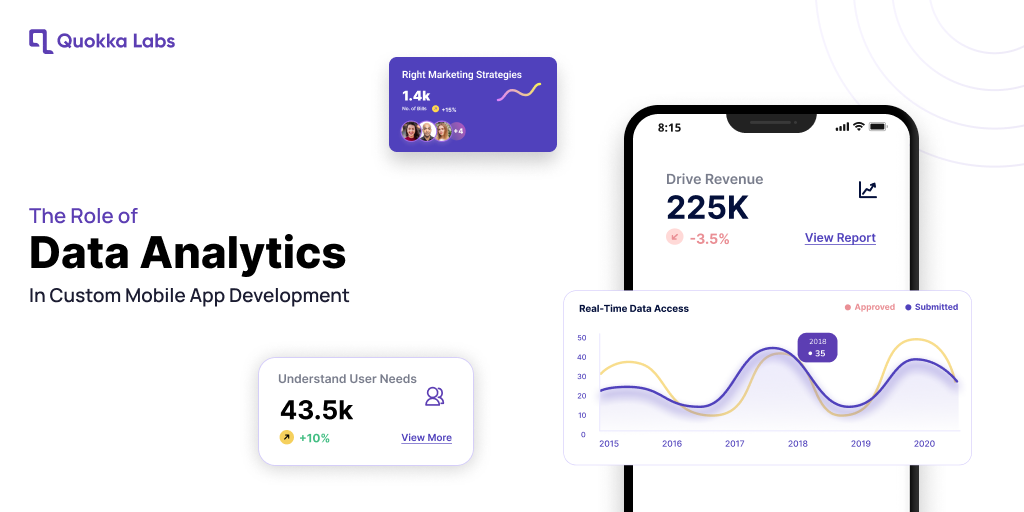Blog
The Role of Analytics in Mobile App Development
June 15, 2023
Posted by: DevDigital
In the highly competitive world of mobile app development, understanding user behavior, preferences, and trends is crucial for success. This is where analytics plays a pivotal role. Analytics in mobile app development involves collecting, measuring, analyzing, and interpreting data to gain valuable insights into app performance, user engagement, and overall business success. In this article, let’s explore what it means to unleash the power of data, especially when you need a new website and want to develop a mobile app that aligns with your business goals.
As a mobile app development leader in Nashville, we want to discuss the significant role of analytics in mobile app development and how it empowers businesses and developers to make data-driven decisions, optimize user experiences, and drive app success in today's digital landscape.
User Behavior Analysis: Analytics enables a custom software development agency and mobile app developers to gain deep insights into user behavior within a company’s mobile app. By tracking and analyzing user interactions, such as screen views, clicks, navigation paths, and in-app actions, developers can identify usage patterns, popular features, and areas of improvement. This information helps in making informed decisions about app design, user flow optimization, and feature enhancements. Understanding how users engage with the app allows developers to tailor the user experience, improve user satisfaction, and increase user retention rates.
App Performance Monitoring: Analytics provides valuable data on app performance, such as loading times, crashes, and errors. By closely monitoring these metrics, developers can identify performance bottlenecks, bugs, and areas that require optimization. Real-time performance monitoring helps ensure the app delivers a seamless and reliable user experience. Developers can proactively address performance issues and prevent user frustration, negative reviews, and app abandonment. Analytics also provides valuable insights into different device types, operating systems, and network conditions, allowing developers to optimize app performance across various platforms and configurations.
Conversion and Retention Tracking: Analytics enables businesses to track and measure conversions within their mobile apps. Whether completing a purchase, signing up for a subscription, or achieving a specific goal, analytics provides valuable data on user conversion rates and behaviors. Businesses can identify drop-off points and optimize the user journey to improve conversion rates by analyzing conversion funnels. Analytics also helps track user retention, measuring how long users continue to engage with the app over time. This information is vital for understanding the app's stickiness, identifying churn factors, and implementing strategies to boost user retention and loyalty.
Personalization and User Segmentation: Analytics plays a crucial role in understanding user preferences and segmentation. By analyzing user data such as demographics, behavior, and engagement patterns, businesses can create personalized experiences tailored to individual user needs. Analytics allows for dynamic content delivery, enabling businesses to show targeted recommendations, offers, and notifications based on user preferences and past interactions. By segmenting users into groups based on their characteristics and behaviors, businesses can further refine their marketing strategies and deliver personalized messaging, improving user engagement and driving app usage.
A/B Testing and Feature Optimization: Analytics facilitates A/B testing, which involves comparing the performance and user response to two or more variations of an app's design or features. By using analytics data to track and measure the performance of different variations, developers can identify which design or feature resonates better with users. This helps in making data-driven decisions on feature implementation, user interface design, and overall app optimization. A/B testing empowers developers to iterate and improve app performance based on real user data, ensuring that the app meets user expectations and drives positive outcomes.
App Store Optimization (ASO): Analytics plays a crucial role in App Store Optimization, which aims to improve an app's visibility and discoverability in app stores. Businesses can optimize app metadata, keywords, and descriptions by analyzing user search trends, keyword performance, and conversion rates to improve search rankings and attract more organic app downloads. Analytics also provides insights into user reviews and ratings, helping businesses identify improvement areas and promptly address user concerns. App Store Optimization leverages analytics data to enhance app visibility, drive app downloads, and ultimately increase user acquisition and app success.
Competitive Analysis: Analytics allows businesses to gain insights into their competitors' app performance, user engagement, and feature adoption. By monitoring competitors' app rankings, user reviews, and feature updates, businesses can identify industry trends, benchmark their app's performance, and stay ahead of the competition. Analytics data provides valuable information on user sentiment, preferences, and expectations, enabling businesses to identify gaps in the market and develop innovative features or improve existing ones. Competitive analysis through analytics empowers businesses to make informed decisions about their app's positioning, user experience, and marketing strategies.
In the dynamic and fiercely competitive world of mobile app development, analytics plays a significant role in driving success. By harnessing the power of data, businesses and developers can gain valuable insights into user behavior, app performance, conversions, and competition. Analytics enables data-driven decision-making, helping businesses optimize user experiences, enhance app performance, and drive app success. By closely monitoring user behavior, tracking app performance, implementing personalization strategies, and leveraging A/B testing and app store optimization, businesses can stay ahead of the curve, deliver exceptional user experiences, and achieve their mobile app development goals in today's data-centric digital landscape.
When you need a new website, look no further than DevDigital, a web design agency in Nashville specializing in custom software and mobile app development. Call DevDigital today to learn how to leverage your website and mobile app analytics to propel your company’s success.
